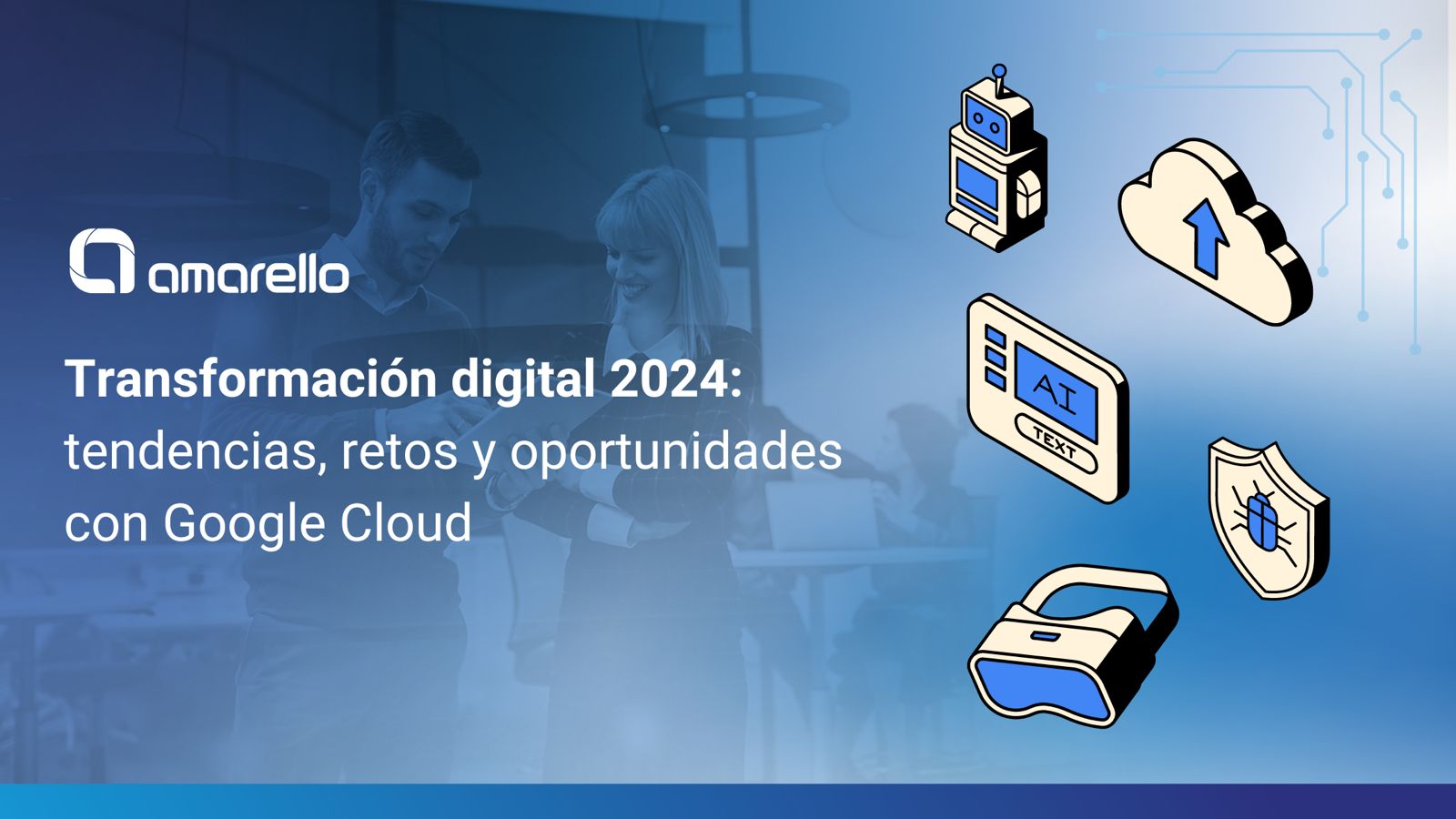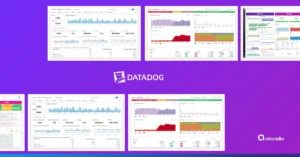The constant adoption of new technologies to improve the quality of life is a continuously evolving process that has been part of the history of mankind, impacting with significant changes in the way of socializing and living of civilizations since their first discoveries such as the wheel and fire.
In the past, the most representative example of the transformative impact of technology was the industrial revolution, a period of great changes driven by the adoption of physical technologies such as the steam engine and electricity. Today we are participants and witnesses of a new revolution, the digital transformation, a process of significant changes, driven by the adoption of new intangible technologies such as cloud computing, big data or artificial intelligence.
You may be interested in: Big Data: The best ally to know what’s happening in your business
It is a phenomenon that is redefining the way we interact with the world, and therefore the way we do business. While it is possible to observe the impact of digital transformation in various aspects of life, including the most everyday situations such as the way we consume like music or movies, and even in the way we stock the pantry, its effects are more noticeable in the business sphere.
Today, companies not only adopt digital technologies to optimize processes, increase productivity, improve efficiency, and increase profits by providing satisfactorily memorable experiences for their customers; but from the process of digital transformation, companies reinvent themselves, rediscovering new business opportunities, strategic alliances and expansion possibilities.
This unstoppable phenomenon has only accelerated exponentially in recent years, driven by a symphony of factors ranging from the increasing availability of new and more accessible digital technologies to evolving consumer expectations and market competition.
In this context, it is essential to keep updated on the topics related to the trends and challenges of digital transformation to achieve a successful adoption of this process and stay at the forefront of evolution. That is why we prepared this article to help you learn about the challenges, trends and opportunities of digital transformation and how to take advantage of them with Google Cloud and Amarello’s expertise.
The challenges
Let’s start by clarifying that digital transformation is a complex and challenging process, which does not follow a linear and predictable course, thus requiring a continuous investment of time, effort and resources.
Explore also: Big Data in the cloud: what stage is your company at?
Therefore, it is important for organizations to have a clear and defined strategy before starting or else to avoid unproductive waste of resources. This means that the first major challenge for organizations lies in the creation of a customized strategy to optimize the effective investment of resources and prioritize their key needs, other challenges include:
- Talent Shortage
The digital transformation process has accelerated so much that innovation processes often surpass training processes, which represents a challenge for companies seeking to stay ahead of the curve, as the demand for specialized profiles exceeds the supply of available talent, hindering the adoption process due to steep learning curves.
In addition, this implies a greater demand for resources by forcing companies to compete for the most qualified professionals.
- Security
The hyper-connectivity of the digital age also means exposure to new security risks and unwanted vulnerabilities. Although the general public does not yet prioritize the protection of their data and personal information online, companies must be forewarned, as the theft of sensitive information can result in millions of dollars in losses and digital isolation is not a viable option.Even criminals and cybercriminals make use of new technologies to increase the frequency and effectiveness of their attacks, increasing the incidence rate in the attempt to steal sensitive and confidential information.

- Accelerated Technological Evolution
As mentioned above, digital transformation is undergoing a process of acceleration that, far from decreasing, seems to be increasing all the time. This is largely self-powered, since technological changes accelerate innovation processes by reducing research times and providing new tools that bring with them cultural changes that favor collaborative work.
This poses a challenge for companies that must invest in elastic tools, capable of evolving to adapt and integrate with new solutions in a flexible, practical and efficient manner.
- Cultural Change
Although at first glance the cultural change may go unnoticed, as mentioned above, the adoption of technologies represents a paradigm shift in the way human beings socialize and live; this includes, of course, the way they work.
The technologies of digital transformation respond to a need for hyperconnectivity, which not only facilitates, but also promotes collaborative work, as well as being dynamic and continuous, requires environments in which employees feel comfortable to adopt these technologies; therefore it is essential that companies promote a collaborative culture of innovation and continuous learning.
This goes beyond establishing team meetings and ongoing training, it requires a higher level of empathy with employees, access to the right tools, flexibility to perform their activities, and understanding their motivations to focus them on a mutually beneficial commitment.
The trends
You know the challenges and with an eye on the dynamic digital transformation landscape, it’s time to explore the trends that will shape the future and capture global attention this 2024. What innovations and strategic approaches will mark the journey to this exciting future? Let’s find out together!
- Cloud adoption
The cloud is and will continue to be a reference platform for digital transformation. It offers companies a series of benefits in data storage and processing, such as scalability, flexibility and efficiency, however, a crucial advantage is security, which is a native improvement over on-premise storage.
Discover : Machine Learning: Future and mainstay of online stores?
Additionally, the cloud enables integration with advanced security tools that allow for better protection of sensitive information and data, as well as increasing accessibility for collaboration between teams, and representing a substantial reduction in long-term costs.
- The Internet of Things (IoT) and the value of data in action.
Data is the fuel behind digital transformation. Companies that can effectively collect, analyze and leverage data can capitalize on its value by deploying it to drive innovation, improve efficiency and streamline strategic decision making, resulting in competitive advantage.The incalculable value of data is undeniable. But the key to harnessing its power lies in processing it effectively; in this sense, data collection is essential for data analytics, and IoT revolutionizes the way this is done.
Devices connected to the network generate a large amount of data that can be used to obtain information about customers, products, processes, as well as the behavior of its users, so integration with IoT devices and platforms is booming.

- Immersive and Omnichannel Experiences
Nowadays, in addition to being more informed, consumers have a wide variety of options to satisfy their needs, so their consumption is more critical and demanding; making the interaction of companies with their consumers a key aspect for customer service and its valuation among consumers.
To stand out, companies must evolve their content strategy and user experience design to adapt to multiple channels such as: websites, social networks, mobile apps, and physical stores. And the integration of tools such as chatbots, virtual and augmented reality has become an essential practice to offer immersive, unique, memorable and satisfying experiences.
- Artificial Intelligence
AI has become a key tool to help companies automate tasks and streamline processes. This tool can be implemented in various activities such as security management, customer service, and even strategic decision making, including the creation of new products and services, and its virtually unlimited potential consolidates it as a key disruptive technology in digital transformation.
- Machine Learning
This technology enables systems to learn and improve autonomously, revolutionizing advanced automation processes, driving the evolution of AI by unlocking tasks that were previously unachievable or too costly to automate. In addition to having diverse applications, including strategic decision making, as well as the creation of new products and services.
Google Cloud: Unlocking Opportunities in Digital Transformation
Now that we have explored the trends and challenges of digital transformation in 2024, the key question arises: How to capitalize on the opportunities that this landscape offers? In this dynamic environment, flexible solutions are essential.
Google Cloud understands this and offers solutions capable of addressing present challenges and adapting to future challenges, among which we can highlight the following:
- Anthos: Cloud adoption is critical, but which cloud is best, what about On Premise advantages, what about my legacy applications, and how can I reduce costs?
So you don’t have to worry about all those issues, Anthos is a hybrid, multi-cloud infrastructure platform that enables enterprises to run applications in any environment, regardless of whether they are in the cloud, on-premises or a combination of both.
Anthos also helps companies manage multiple storage environments centrally and securely, allowing them to take advantage of the benefits of each solution, without having to restrict themselves to a single cloud service provider.
- BigQuery: Data is the fuel of digital transformation, and BigQuery is a powerful data analytics platform that enables companies to collect, store and analyze large amounts of data quickly and easily.
BigQuery also stands out for its superior speed, allowing for near real-time queries with high accuracy. In addition, it is a tool optimized for integration with multiple solutions that enhance data analytics.
- Looker: AI is transforming multiple aspects of everyday life, and business is no exception. Looker is a business intelligence (BI) platform that allows companies to explore and analyze their data in a visual and intuitive way, making it easy to identify trends and patterns, which helps companies leverage their data to make better decisions.
Optimized to meet the challenges of understaffing and security, its user-friendly interface adapts to users of all levels, allowing them to explore and analyze data efficiently. It also integrates advanced security, with governance controls that protect privacy without compromising the accuracy of analysis.
- Apigee: Part of the digital transformation lies in cultural change and the adoption of collaborative work.
Apigee is an API management platform that enables companies to integrate their systems with external services in a secure and collaborative way. It also facilitates the creation, development, documentation and monetization of APIs, which fosters the DevOps and APIOps culture.
Security Command Center: Security is a priority, especially in the face of rampant cybercrime incidents; Security Command Center (SCC) is an advanced cloud-native security platform that enables enterprises to protect their data and applications in the cloud.
Integrating a comprehensive database of recognized security threats, advanced AI, plus an intuitive interface that provides centralized control of your security in the cloud. SCC allows you to detect vulnerabilities and threats, take preventive measures, including intelligent alerts and personalized recommendations that help companies contain and mitigate threats.
- Vertex AI: Machine learning within everyone’s reach, if AI and ML emerge as the future of digital transformation, the priority lies in making the most of these tools and Vertex AI presents itself as the key to unlocking their full potential.
Vertex AI is a cloud-based machine learning platform that enables enterprises to create, train and deploy machine learning models quickly and efficiently, integrating an extensive library of tools and an intuitive interface that makes machine learning easy to use, even for users with no prior experience democratizing access to the power of AI and ML.

Amarello, as your strategic ally, complements this proposal by enhancing the implementation of these solutions to provide a comprehensive and customized implementation that maximizes the benefits of each solution, helping you to achieve your business goals.
With over 15 years of experience in the business and recognized as a 2023 Google Cloud Partner of The Year for Serviceswe guarantee the maximum return on your investment with concrete results.
If you would like to learn more about how Amarello can help you transform your business, and capitalize on the opportunities of digital transformation, contact us today.



